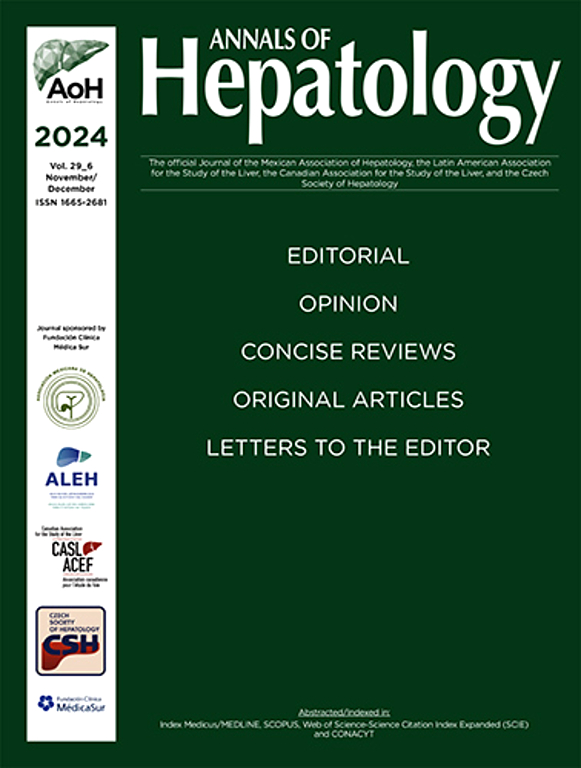生物活性咖啡化合物协同增强体外化疗和免疫治疗肝癌的抗肿瘤作用
IF 4.4
3区 医学
Q2 GASTROENTEROLOGY & HEPATOLOGY
引用次数: 0
摘要
简介和目的肝细胞癌(HCC)具有高的全球发病率和死亡率以及不良的预后。尽管目前晚期HCC的治疗方法很有希望,但其结果仍然有限。在这种背景下,人们对创新策略的兴趣越来越大,例如将生物活性化合物(bc)与化学和免疫疗法相结合。咖啡中的bc因其在流行病学和实验研究中报告的化学预防作用而脱颖而出。然而,它们的抗肿瘤潜力,特别是与传统疗法的结合,仍然不完全清楚。在这项研究中,我们研究了咖啡衍生的化合物是否可以增强sorafenib (SOR)和atezolizumab + bevacizumab (ATZ+BVZ)的体外抗肿瘤作用。材料与方法将slx2肝星状细胞和HepG2/C3A (HCC)细胞分别培养于3D (spheroids)和2D (transwell)体系中,分别用咖啡因(CAF)、葫芦巴碱(TRI)、绿原酸(CGA)、咖啡酸(CA)、咖啡豆醇(KWL)、SOR、ATZ和BVZ处理24和48 h,测定一半最大有效浓度(EC50) (MTT/LDH法)。接下来,将咖啡化合物与SOR或ATZ+BVZ以亚有效和生理上合理的EC50分数(1/ 5,1 /6或1/10)组合,并通过MTT (3D),划痕(迁移)和菌落形成试验(2D)进行评估,并计算组合指数。结果scga、CA、TRI对治疗有拮抗作用。相反,CAF或KWL协同增强了SOR和ATZ + BVZ的抗肿瘤作用,降低了球体活力。CAF联合KWL进一步增强了两种治疗的抗肿瘤作用,也抑制了集落的形成和细胞的运动。结论咖啡衍生化合物可增强肝癌的治疗效果。进一步的实验包括体外代谢组学和转录组学,以及体内异种移植小鼠模型。本文章由计算机程序翻译,如有差异,请以英文原文为准。
BIOACTIVE COFFEE COMPOUNDS SYNERGISTICALLY ENHANCE THE ANTITUMOR EFFECTS OF CHEMO AND IMMUNOTHERAPY FOR HEPATOCELLULAR CARCINOMA IN VITRO
Introduction and Objectives
Hepatocellular Carcinoma (HCC) yields high global incidence and mortality rates and an unfavorable prognosis. Although current therapies for advanced HCC are promising, their outcomes remain limited. In this context, there is increasing interest in innovative strategies, such as combining bioactive compounds (BCs) with chemo- and immunotherapies. BCs in coffee have stood out due to their chemopreventive effects reported in epidemiological and experimental studies. However, their antitumor potential, particularly in combination with conventional therapies, remains incompletely understood. In this study, we investigated whether coffee-derived compounds could enhance the antitumor effects of sorafenib (SOR) and atezolizumab plus bevacizumab (ATZ+BVZ) in vitro.
Materials and Methods
LX2 hepatic stellate cells and HepG2/C3A (HCC) cells were cultured in 3D (spheroids) and 2D (transwell) systems, and treated with caffeine (CAF), trigonelline (TRI), chlorogenic acid (CGA), caffeic acid (CA), kahweol (KWL), SOR, ATZ, and BVZ for 24 and 48 h for half maximum effective concentration (EC50) determination (MTT/LDH assays). Next, the coffee compounds were combined with SOR or ATZ+BVZ at sub-effective and physiologically plausible EC50 fractions (1/5, 1/6, or 1/10) and evaluated by MTT (3D), scratch (migration), and colony formation assays (2D), with combination index calculation.
Results
CGA, CA, and TRI showed antagonistic effects to the therapies. In contrast, CAF or KWL synergistically enhanced the anti-tumor effects of SOR and ATZ plus BVZ in reducing spheroid viability. The combination of CAF plus KWL further intensified the anti-tumor effects of both treatments, also inhibiting colony formation and cell motility.
Conclusions
These findings suggest that coffee-derived compounds may strengthen the therapeutic efficacy against HCC. Further experiments include in vitro metabolomics and transcriptomics, and in vivo xenograft mouse model.
求助全文
通过发布文献求助,成功后即可免费获取论文全文。
去求助
来源期刊

Annals of hepatology
医学-胃肠肝病学
CiteScore
7.90
自引率
2.60%
发文量
183
审稿时长
4-8 weeks
期刊介绍:
Annals of Hepatology publishes original research on the biology and diseases of the liver in both humans and experimental models. Contributions may be submitted as regular articles. The journal also publishes concise reviews of both basic and clinical topics.
 求助内容:
求助内容: 应助结果提醒方式:
应助结果提醒方式:


